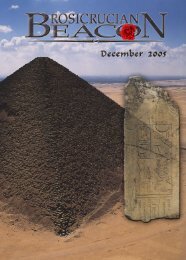y Samuel Avital, FRCThe guest residing in eachof us is a part of the greatCosmic Soul.e have all experienced thewonderful warmth of being a guestin someone’s home. Equally, we knowthe deep satisfaction of having been ahost or hostess offering our hospitalityto another person. There is a genuine give andtake when a visitor is welcomed into the home,an exchange replete with great meaning andsignificance in all cultures down through theages.Consider for a moment your own house, withyou as a guest residing within. The house providesyou with shelter and warmth and a place from whichto operate. In return, you maintain it, keeping it cleanand orderly. You, the guest, are actively contributingto the life of the host. In fact, you are the very lifewithin that house.What about your own body, the “Temple ofthe Soul?” Is it not also a house, a dwelling placefor a very important guest? The house that sheltersus, made of stone, brick or wood, is obviously notconscious or aware of our presence within its walls.But we are endowed with the gift of consciousnessand self-awareness on both the mundane andspiritual levels, and should be aware of the guestresiding within us.We may sense the presence of a “still smallvoice” (inner quiet), in Hebrew kol dernama dakasometimes referred to as the Inner Self or the MasterWithin. We may even have begun to develop arelationship with this presence. But are we using theconsciousness we have been given to truly know theInner Guest?In Hebrew, the word for guest is ore’ach, whichalso means “visitor, path, the way, the traveller onthe path.” In Aramaic, the word is oushpiz means“visitor” or the “holy or honoured guest.”Honoured GuestThe idea of the honoured guest has been carriedwith us since ancient times as part of our humanheritage. In the Hebrew tradition there is a saying,“He who has fed a stranger may have fed an angel.”We see an example of this in the Bible, whenthree guests appear to Abraham and receive fromhim unquestioning service and assistance. Abrahamlearns from these “messengers” that he and his wifewill have a son, even though they are both old andSarah had been barren for many years. The story ofAbraham symbolises the high stature of the guestas a divine messenger. Surely every guest brings a“message” and should be received with the samereverence that Abraham had for his visitors.Let us now consider the less obvious meaningsof the Hebrew and Aramaic words for “guest,” suchas “the path,” “the way,” “the traveller on the path.”In the bible, Jesus is quoted as saying, “I am the Wayand the Truth and the Life” (John 14:6). We know thatJesus and many other great teachers like Moses,Buddha and the prophet Mohammed lived theirlives as examples, pointing the way for others tofollow. They were also wanderers themselves and24The Rosicrucian Beacon -- June 2008
“travellers on the path,” like moving, focal points;spiritual reference points of living paradox.What then about the Master Within, the “IAm” that dwells in our bodily temple, formed bycellular bricks of light? It too is a guest, a messengerfrom the Cosmic and deserving of our highestrespect. The guest residing in each of us is a part ofthe great Cosmic Soul and therefore also representsthe path or the way. It is by keeping our inner eartuned to the silent self, our inner eye focused on theinvisible guide, that we are directed on our propercourse.The Master WithinAnd, like the great avatars whose lives haveinspired us, the Master Within is also a traveller.This traveller comes to us from afar, enteringthe body with the first breath. It carries nothingin the way of material gifts, but brings to us therichness of a knowledge more vast than we canimagine, a knowledge drawn from every cornerof the universe.Now that we begin to recognise our guest,how do we attune with the holy presence within?First, we must learn to be like nature…, ready,grounded, still and silent; for it is in the stillness andsilence that the Master Within is revealed, and onlyto the one who is waiting and ready to receive withan open heart. It may take some time for us to reachthis state of receptivity. In preparation, we must keepa watchful eye on all that enters our “house” and allthat radiates out from it, so that ours will be a templeworthy of the presence of the Inner Guest.Each thought that knocks at the door of themind should be examined and only the purestallowed to enter. Similarly each word we uttershould pass through three holy gates: truth, necessityand kindness. Our actions too must be constructiveand harmonious so that we may prove ourselves,to ourselves, as deserving of the Master Within. Inpreparing ourselves for attunement with the InnerSelf, we are reminded that the personal guest residesin all other beings as well. There may be many“houses” but only one guest: many bodies, but thesame one Soul expressing itself in a myriad of specialways, like the many petals of our beloved rose, or themany rays of the one Sun, the source of light of oursolar system.When two houses, two beings, face oneanother, they may recognise the same guest lookingout through the “windows of the soul.” In thisconstant reflection, the Inner Self is ever manifesting.That is why we are instructed in the ancient textsto “welcome everyone with joy,” for “to welcomea fellow man is to welcome the Shekina (Divinepresence)” says the Midrash. In the Jewish tradition,this is called “The Holy Meeting.”What better encouragement could we hopefor, what greater security than to know that theall-embracing Consciousness of the Cosmic iseverywhere and in everything? We need only directthe questioning mind to this great fount of wisdomin order to draw from its infinite consciousness themessage that we need at any given time.Expanding ConsciousnessTo do this requires that we expand our personal“little self” view to include the Guest residingin all beings and in all things. With a heart thatknows how to wait, we gradually extend ourboundaries far beyond the physical, mental andemotional definitions of self. Only in this way canwe partake of the whole.But a word of caution from our brethren,the Sufis! “Don’t make friends with an elephanttrainer unless there is space in your living room for anelephant!” or “Trust in God, but tie your camel first.”Fortunately, the Rosicrucian teachings guide usstep-by-step through our unfoldment; each phaseperfectly designed so we are able to graduallyembrace a larger universal view, our consciousnessexpanding in its own time.We experience disharmony only when wecut ourselves off from the perfect connectedness ofall creation, and this is obvious to the true student.The Guest residing within us and around us isour constant reminder of our rightful place in thecosmic scheme, ever affirming our true sense ofbelonging and purpose. It is by attuning with ourGreater Self, through a proper word and properact, that all health and harmony are restored.When we stop to reflect, we see that theGuest is the very life within us, just as we are thelife within our material homes of brick, stone andwood. The Guest keeps the eternal flame of Lifeburning in our house, radiant and resplendent. Webehold the same Light shining within every otherhouse. It is the fire of Love, a jewelled lamp in thewindow of every dwelling to welcome the wearytraveller. There is a profound saying: “If it is darkenough, one candle is plenty.” May the Light, Lifeand Love of the Guest guide us on our journey andremind us that our real home is the whole universe,our destination, the infinite.The Rosicrucian Beacon -- June 200825











